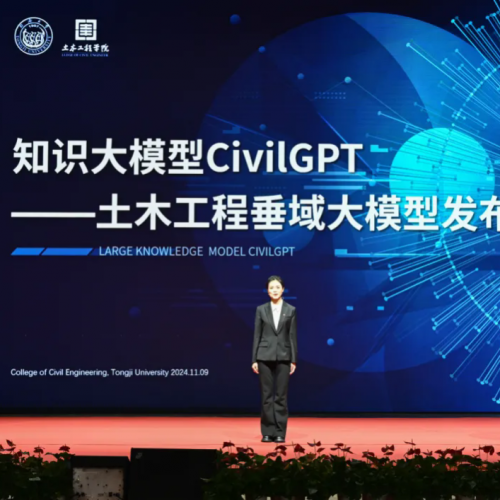



Tongji University released CivilGPT, a large knowledge model independently developed by its College of Civil Engineering, to provide personalized learning pathways for students in the civil engineering discipline and help them tackle interdisciplinary engineering problems, on Saturday.
The tool empowered by artificial intelligence, which the Shanghai-based university claimed as the first generative AI model registered in the country's education sector, was also intended to provide strong support for practical engineering activities and become an important intelligent assistant for engineers.
The AI tool was unveiled at a major forum commemorating the 110th anniversary of the civil engineering discipline at the university, which brought together prominent representatives from the government as well as universities and enterprises from home and abroad.
The school said the new tool is one of its latest example to explore the transformation and upgrading of traditional engineering with digital intelligence. Integrating 44 professional courses, more than 500,000 pages of professional materials, over 2,600 textbooks and specifications, and around 70,000 exam questions, CivilGPT realized accurate understanding and efficient reasoning of the complex knowledge system in the field of civil engineering, the school said.
Based on the knowledge graph in the civil engineering field constructed by Tongji University, the tool involves more than 11,000 knowledge points and over 13,000 relationships between them, which is able to intelligently locate knowledge points in which each student is not good at. The tool also integrates knowledge from multiple relevant engineering fields, such as transportation, environment, mechanics, and materials.
With functions, including self-testing and replying to students' queries around the clock, the tool can promote collaborations and interactions among teachers, students, and machines, and creates a new personalized learning model for civil engineering education.
At the forum, Zheng Qinghua, president of Tongji University, emphasized the integral role of the discipline of civil engineering in national construction and development, highlighting the school's commitment to cultivating talent and driving innovation.
"We envision for the future that we better leverage digital intelligence and create a sustainable development ecosystem, advocating for an integrated approach to enhance national progress and contribute to global civilization," said Zheng, who is also an academician with the Chinese Academy of Engineering.
Huang Yu, Party secretary of the College of Civil Engineering at the university, said that they will make continuous efforts to align the discipline with national strategic needs through initiatives focused on digital intelligence, sustainability, and integration.
If you have any problems with this article, please contact us at app@chinadaily.com.cn and we'll immediately get back to you.